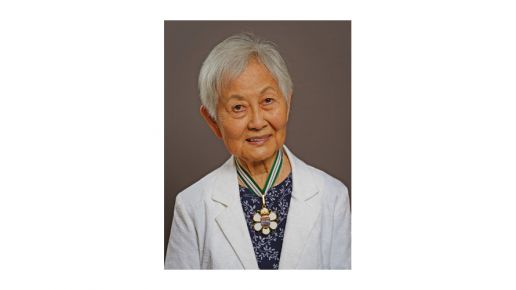Faced with innumerable challenges throughout her life, Mary Murakami Kitagawa has not only persevered, as her parents taught her. She has also become a lifelong educator, a hero in the fight against injustice and a tireless advocate for the truth.
A proud family
Mary Murakami was born in 1934 to Katsuyori and Kimiko Okano Murakami, on Salt Spring Island, B.C. Kimiko had been born in B.C. to Japanese immigrant parents, who later sponsored her husband to emigrate from Japan. Kimiko and Katsuyori raised their five children across the road from her parents’ thriving 200-acre farm. They purchased 17 acres of wilderness and over nine years turned it into a successful farm, producing berries, vegetables and eggs from more than 5,000 chickens. They were a strong team, and Kimiko in particular was “a force,” whom Katsuyori often credited with their family’s success.
A dark chapter in Canada’s history
Murakami was seven years old when Canada declared war on Japan following the attack on Pearl Harbour. Prime Minister William Lyon Mackenzie King then invoked the War Measures Act, forcing the uprooting and enslavement of Japanese Canadians—including Canadian citizens like Murakami and her siblings—after falsely proclaiming them a threat to national security.
On March 17, 1942, Murakami and her siblings witnessed their father being arrested by RCMP officers, with no idea why or where he was being taken. They later learned he had been sent to an internment camp for Japanese Canadians and forced to build roads. Less than a month later, on April 22, 1942, Murakami, her mother and her four siblings—all of whom had been born in Canada—along with her grandparents, were forced to leave their home and their possessions behind, boarding a ship to the mainland. They would never again live on the family’s farms.
It was the beginning of a shameful and little-known period of Canada’s history: Nearly 22,000 Japanese Canadians were imprisoned in internment camps, prisoner of war camps and work-prison camps, and forced to work as sharecroppers on sugar beet farms. Murakami and her family were sent to live in animal barns at Hastings Park in Vancouver, the first of five internment camps they would live in, in sub-human conditions. Reunited with Murakami’s father at one of the camps, in Magrath, Alberta, they struggled to survive over the next seven years, during which time Murakami’s youngest brother was born. The government had seized the family’s property and assets, providing them with a meagre monthly allowance from their own frozen bank accounts. “We paid for our own imprisonment,” says Murakami.
Not a single Japanese Canadian was ever charged with any wrongdoing, and yet it would take four more years after the Second World War ended for Japanese Canadians to be freed.
After working in a restaurant in Cardston, Alberta for five years, where Murakami graduated from high school, the family returned to Salt Spring Island in 1954. They were greeted with hostility and rampant racism from locals. Denied the option of buying back their farm, they purchased five acres of scrubland and started over. Murakami spent a year there helping her parents to clear and begin farming the land.
Arriving at Trinity
In 1955, Murakami enrolled at Trinity College, “because it was Anglican and I had been baptized in the Anglican Church.” She had very little money and spent the first few months living with family friends in Etobicoke (“it took so long for me to commute to and from campus”) before securing a job as a nanny in Forest Hill, where she worked for room and board.
“The family I worked for was very kind to me,” remembers Murakami, who commuted to campus for classes only, studying English, French, Home Economics, Anthropology, Sociology, Food Chemistry, and Religious Studies. She told no one of her experiences during and after the war, except for one other student—Katherine Miwa ’59, whom she befriended and whom she learned had also endured incarceration at the camps. The two bonded over their shared experience, which they kept a secret.
Speaking her truth
After Trinity, Murakami attended the University of British Columbia (UBC) to earn her secondary teaching certificate, and became a high school teacher in Vancouver, B.C., where she met Tosh Kitagawa. The couple married, had two children, and eventually relocated to Tsawwassen, B.C., where they have lived for more than 50 years.
After her children completed high school, Murakami decided to go back to UBC to learn about the Japanese language and Asian studies. One of her professors encouraged her to write about her family’s experience during the Second World War. It was only then that Murakami began to delve into the stories of her past.
“What I learned is that the more I talked about the experiences of my childhood, the less painful they became for me,” she says. She and her husband also became actively involved with the Japanese Canadian community.
Seeking justice for others
In 2008, the couple wrote to UBC, asking the university to grant honorary degrees to the 76 Japanese Canadian students who were expelled in 1942 when the internment began. At first, they received no response: “I think they thought if they ignored me I would give up,” quips Murakami. “But my parents raised us to never give up.”
In 2011, UBC agreed to grant the degrees, but did not have any official records of the students affected by the internment. Murakami and her husband worked with the Japanese Canadian community to spread the word, and together managed to locate the students or their surviving family members. In 2012, UBC held a special ceremony for those students. “It was a very emotional day,” says Murakami.
At the same time, UBC’s Faculty of Arts launched the Asian Canadian and Asian Migration Studies program to honour the students’ memory. Courses explore the importance of Japanese Canadians and other Asian Canadians in the country’s history, including the role played by anti-Asian racism in producing events such as the Japanese Canadian internment. The school asked Murakami to co-teach one of the courses. “I said sure, only I was 84 at the time and I didn’t realize how much energy it took. It was exhausting but I enjoyed it,” says Murakami, who has since retired from teaching.
Well-deserved honours
In 2013, Murakami was awarded the Queen Elizabeth II Diamond Jubilee Medal. In 2018, she received the Order of British Columbia for her activism on behalf of Japanese Canadians. And in 2020, UBC awarded her an honorary degree for her work as a social justice and anti-racism leader and activist (watch the online ceremony here). She accepted the degree in memory of her parents, and shared it with her husband. “Tosh and I have 12 honours between us,” she says proudly.
A responsibility to share
“My generation is often referred to as ‘the silent generation,’ for our failure to pass on to subsequent generations the stories of what we experienced during and following the Second World War,” says Murakami. “But my parents were never silent. We talked about everything, and they taught us to do the same, and to be as brave as they were.”
Despite their hardships, Murakami’s parents also taught their children forgiveness. “They would say that anger becomes a burden,” she remembers. “Forgiveness doesn’t mean forgetting.
“Nothing was written about the experience of Japanese Canadians until 1976, with the publication of Ken Adachi’s The Enemy That Never Was,” says Murakami. “Most of the camps were bulldozed in an attempt to erase history.”
Murakami and Kitagawa have made it their mission to continue to fight racism through education. “At least once a week we present to school children, or community groups or historical societies,” she says, adding that she gets a special sense of fulfillment by sharing her experience with young people. “Grade five students in particular ask the most questions and our discussions are often heartwarming,” she says. “I find as our audiences age, they ask fewer and fewer questions. There seems to be some discomfort in hearing the truth about racism.”
This August Tosh and Mary will celebrate their 60th wedding anniversary. They will celebrate their family’s legacy with their two children, their five grandchildren, and their four great-grandchildren (a fifth is due later this year), all of whom live nearby. And they will continue to tell their stories. “We never say no when we are asked to speak,” says Murakami.
“It’s usually the victors who tell the stories. I share my story to try to make the world a better place. We own our lived experience so must continue to tell it in our own words.”
By Jennifer Matthews

